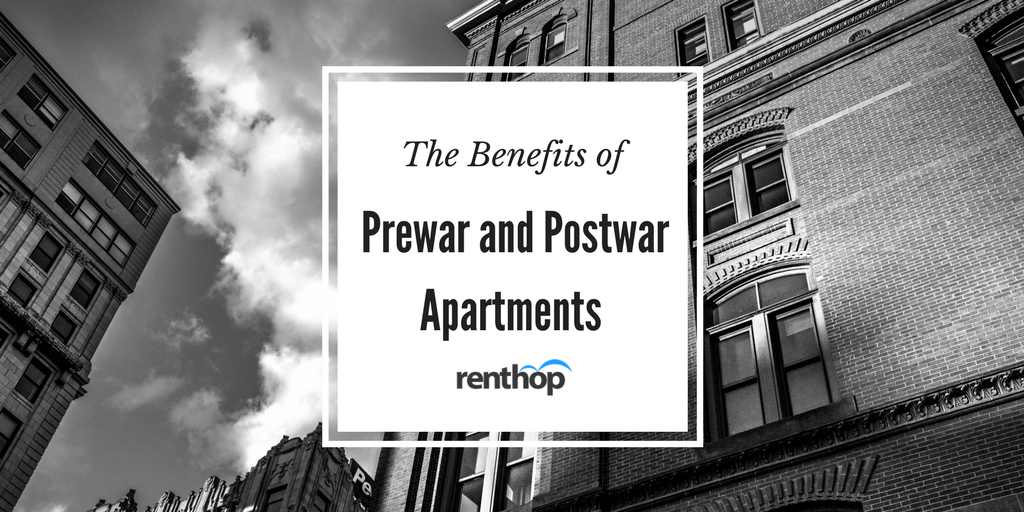When it comes to renting an apartment in New York City, there are two main choices you have in terms of architecture. Most renters will either rent a prewar or postwar apartment, where prewar is anything built prior to World War II. There are numerous benefits of prewar and postwar apartments, with each type containing unique options. This article examines the differences in those benefits so you can make an informed decision during your own rental process.

Benefits of a Prewar Apartment
The following are some benefits to a prewar apartment.
1. Character and Unique Features
One of the biggest selling points and benefits of a prewar apartment is the fact that they aren’t “cookie cutter” like most new apartments are. Most postwar apartment units all look quite similar and many in a similar building will have the same layout. Prewar apartments often have higher ceilings, unique layouts, thick walls and more space. They are sometimes easier to see as “your own” as opposed to postwar, in which your unit is just one of many in a huge building. While many like prewar character and layout, others will prefer the more modern style and design of a newer apartment, it all comes down to personal preference.
2. Structural Integrity
You always hear about older buildings, homes, and apartments being better built than newer ones, and most of the time, that is true. Many prewar buildings have solid concrete floors, plaster walls, and thick doors. These high quality finishes and meant to last, while most newer apartments are fairly fragile under the surface. There is a reason why these prewar apartments are still livable and in good condition after nearly 100 years of use, and that is because they were built well.
3. Often Quieter
Because of the aforementioned structural integrity and quality build, most prewar apartments are quite a bit quieter than newer postwar apartments, as the materials between each unit are often thicker. This isn’t to say that more modern apartments are noisy, but they are generally more economical and efficient to build, which might sacrifice some of the quality that these near 100-year old prewar buildings possess. While the postwar buildings might have better soundproofing technology, they are simply constructed with cheaper, thinner, and more economical materials. Of course, you will find some prewar apartments with little to no soundproofing (and can also find postwar apartments with great soundproofing), but generally, older construction has better protection from you having to hear your neighbors guitar solos.
Benefits of a Postwar Apartment
There are several reasons renters may prefer postwar apartments, including:
1. Access to More Amenities and Features
Perhaps the biggest benefit of postwar apartments is that they have more amenities than the older units. Whether this is an elevator, a fitness center on-site, a doorman, or a variety of other amenities, newer postwar buildings have the edge. With more technology, the actual unit can also have more features. The apartments may have central A/C, a washer and dryer, bigger windows, a dishwasher and more. They often also have a modern design, which some renters prefer over prewar styles.
2. Cheaper Rent in Areas with Lower Demand
While many would think a newer building would be more expensive in terms of rent, this isn’t always the case. In fact, most prewar apartments are actually more expensive as there is a fairly limited supply of good ones and a demand that far exceeds that supply. As a result, renting in a prewar apartment can cost you an arm and a leg. There are many more postwar apartments out there, which means they operate closer to an equilibrium, which means cheaper apartments for you for the most part! Of course, there are millions of apartments out there, so of course, you will be able to find cheaper prewar apartments and pricier postwar apartments as well.
3. More Energy Efficient and Cheaper Bills
In addition to often paying less in rent, you will often pay less in utilities in a newer. Most new buildings make their units energy efficient, while many prewar buildings did not have that technology available during construction. Energy efficient windows and appliances can help to dramatically lower your utility cost each month. This can help a lot especially during cold winters where your heater/furnace is running day in and day out.
Editor’s Note: We updated this article to enhance readability.




